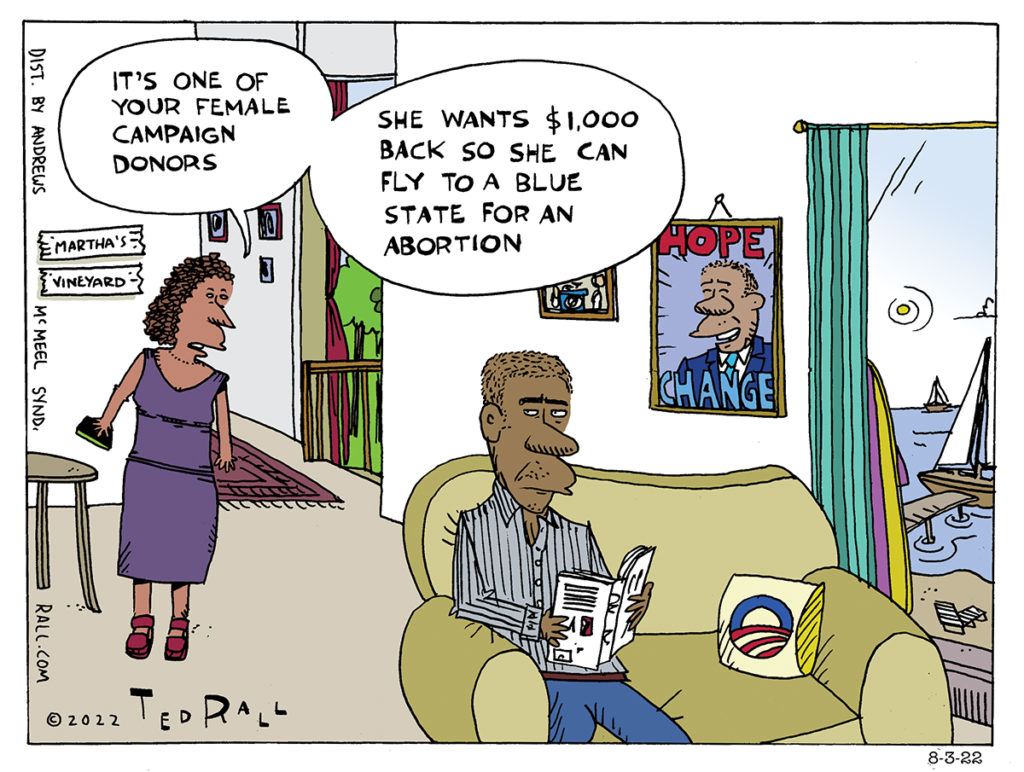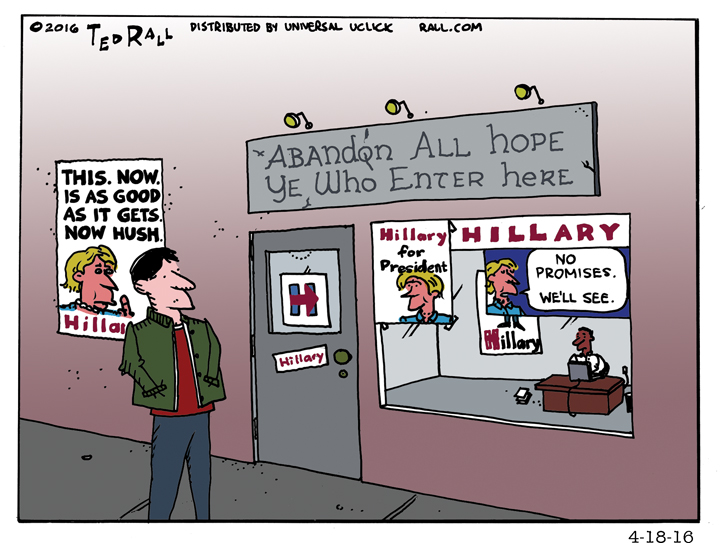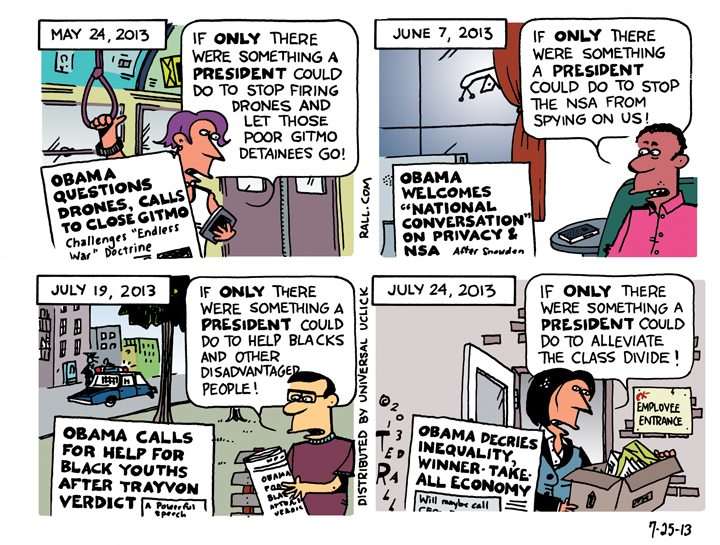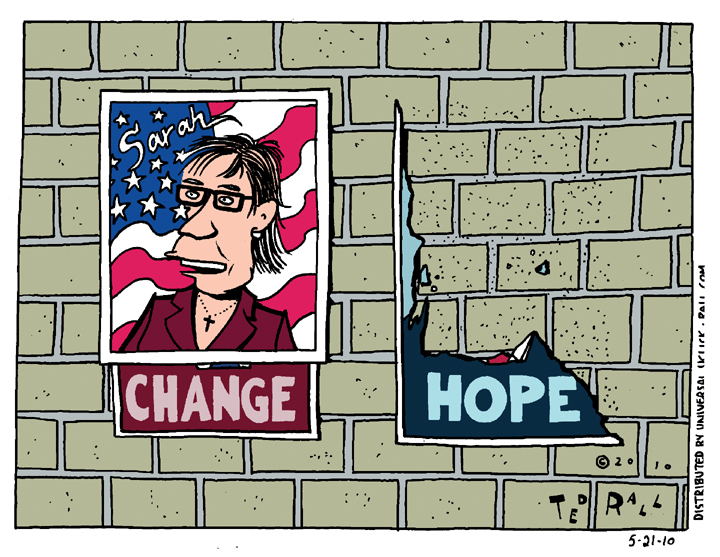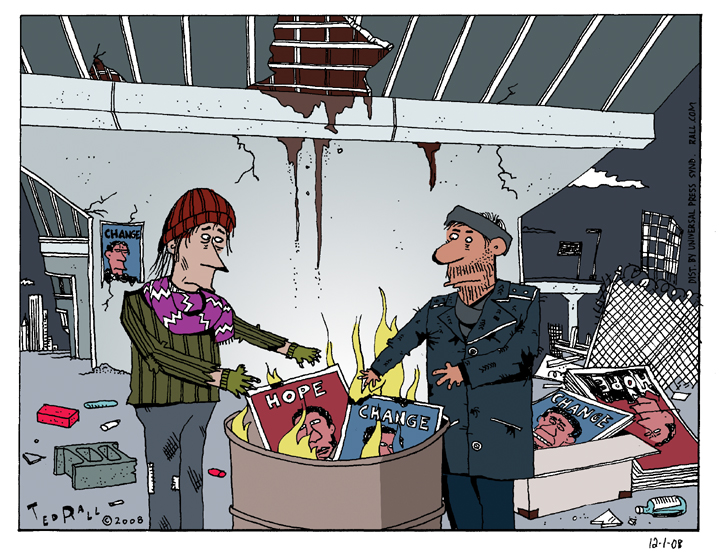Republicans oppose abortion rights in Congress, but Democrats have the chance to codify abortion into federal law when Obama had a 60-vote supermajority in the US Senate. He chose not to do so, saying that it was a low priority. He also made it a low priority to push through his supreme court pick, Merrick Garland, because he assumed that Hillary Clinton would beat Trump.
SYNDICATED COLUMN: The Joy of Hopelessness

Desire, the Indian philosopher Jiddu Krishnamurti taught, causes suffering.
I managed to make it half a century, and thus likely through more than halfway to death (which Arthur Schopenhauer teaches us, is the goal of life), not only by failing to internalize the belief that optimism breeds disappointment, but by passionately refusing to believe it. Without desire, I fervently believed, there is no motivation and thus no accomplishment.
Without ambition, how does one succeed in one’s work or find the love of one’s life? I know people who don’t want anything. They’re called potheads.
But I’ve changed my mind. The stoners may be on to something.
Give up hope — and you might find happiness. I did!
As I’ve read and heard often occurs with spiritual journeys, I arrived at my epiphany as the result of an unexpected accident.
Like other cartoonists, I apply for the Pulitzer Prize, America’s most prestigious journalism award, every January.
I hate it. Yet I do it.
I hate it because it’s a lot of work, the odds are long, and the choice of the winner is usually — to be diplomatic — baffling. Out of the 20-ish times I’ve entered, spending a full day or two each year printing out and pasting up cartoons and clips into a binder (and in the computer age, formatting and uploading them), not to mention 20-ish $50 application fees, all I have to show for my efforts is one finalistship. Back in 1996.
To datestamp this story: the letter was typed. As in: on a typewriter.
Like Charlie Brown trying to kick Lucy’s football, I apply for the Big P under the old New York Lotto dictum that you have to be in it to win it. What if the year I don’t enter is the year that I would have won?
Contest Judge #1 to other Judges: So that’s all the entries in the cartooning category.
Judge #2: Wait a minute. Where’s Ted Rall?
Judge #1: He didn’t apply.
Judge #2: WTF?
Judge #3: I specifically came here to give Ted Rall his long-overdue award!
Judge #1: Me too. I doublechecked. Tragically for journalism, he did not enter.
Judge #4: Can we call him?
Judge #1: That would be against the solemn Rules. We must choose from the other entries.
Judges #2-#4 commit suicide in interesting ways.
The deadline used to be January 30th, so I thought it still was, but they changed it a few years ago to the 25th God knows why. I blew the deadline.
As though carried off by a drone labeled “Short-Sighted Defense Policy,” a metaphorical weight bigger than a crosshatched albatross labeled “National Debt” lifted from my shoulders.
I didn’t enter. So I would not, could not, win.
Which meant I couldn’t be passed up in favor of someone else. To be precise, I couldn’t lose to someone I didn’t think was as good as me.
What a relief!
I really really really don’t mind losing to someone good. When someone good has won, I have been happy for the winner. I did not grit my teeth. I congratulated them, and meant it, and resolved to do better next year.
The problem is, the winner of the Pulitzer is usually very not good. Not as good as me. Not pretty good. Not even as good as average.
Losing to someone whose work I don’t respect hurts because it means either (a) the sucky winner is better than me, so therefore I suck even more, or (b) the Pulitzers are judged by dolts, so I must be an idiot to submit to the process, much less care about the results. I strongly suspect (b), though (a) could be true.
From late January, when I realized that I couldn’t enter, to early April, when they announced the results, I felt lighter on my feet. When my colleagues called to handicap the prize, my usual toxic mix of ambition, dread and fear of disappointment was replaced by the carelessness of knowing that I had no dog in the race and that whatever happened wouldn’t be a reflection upon me. So what if someone bad won? The judges never saw my stuff. So I wouldn’t have to spend weeks and months wondering how it was possible that anyone could look at the cartoons by the terrible winner next to mine and choose him instead of me.
I should confess that other cartoonists, no doubt smarter than me, arrived at this wisdom when they were younger. One, 10 years my junior, casually remarked that she gave herself a mini Pulitzer Prize every year by not entering: $50 a year adds up. Not to mention the time she saved compiling entries.
Last year’s winner turned out to be someone whose cartoons couldn’t possibly be any different than mine. Ditto for the finalists. Given who they chose, the judges weren’t interested in the genre of cartooning I do, so I would never have stood a chance.
Not entering was the right move. Or non-move.
This year, however, I remembered the deadline. To enter or not to enter? I entered.
Now I wish I hadn’t.
(Ted Rall, syndicated writer and cartoonist for The Los Angeles Times, is the author of the new critically-acclaimed book “After We Kill You, We Will Welcome You Back As Honored Guests: Unembedded in Afghanistan.” Subscribe to Ted Rall at Beacon.)
COPYRIGHT 2015 TED RALL, DISTRIBUTED BY CREATORS.COM
SYNDICATED COLUMN: Hope and Change? Not for Americans
Turmoil from Mideast to Midwest
If irony were money we’d be rich.
“You’ve got to get out ahead of change,” President Obama lectured a week ago. “You can’t be behind the curve.” He was, of course, referring to the Middle East. During the last few weeks there has been a new popular uprising every few days: Tunisia, Egypt, Yemen, Jordan, Bahrain, Libya.
And now, Wisconsin.
In Madison, where a new Republican governor wants to gut the rights of state workers to form unions and negotiate for higher wages, tens of thousands of protesters have filled the streets and sat in the State Capitol for days. “It’s like Cairo has moved to Madison these days,” said Congressman Paul Ryan (R-WI).
Revolutionary foment is on the march around the globe, but Mr. Hopey Changey is nowhere to be found now that it’s here in the U.S. Whatever happened to “get ahead of change?” What’s good for the Hosni isn’t good for the Barry.
Deploying his customary technocratic aloofness in the service of the usual screw-the-workers narrative, President Obama sided with the union-busters: “Everybody has to make some adjustments to the new fiscal realities,” he scolds.
“Everybody,” naturally, does not include ultrarich dudes like our multi-millionaire president. Obama, who declared a whopping $5.5 million in annual income for 2009 (the last year available), has neither reduced his salary nor donated a penny of his $7.7 million fortune to the Treasury to help adjust to those “new fiscal realities.”
Hard times, doncha know, are for the little people. “We had to [my italics] impose a freeze on pay increases for federal workers in the next two years as part of my overall budget freeze,” said Obama. “I think those kinds of adjustments are the right thing to do [in Wisconsin].”
“Had to.” Interesting pair of words. They imply that there was no other choice. What a brazen lie.
Three more words: Tax. The. Rich. Rich people and corporations are making out like bandits. If they paid their fair share, there’d be no need to cut budgets.
“Adjustments.” How bloodless. For normal people, Herr President, losing two percent of one’s pay is not a mere adjustment. It hurts.
Obama’s grandstanding had-to freeze on federal pay will save $5 billion over two years. Which is nothing. That’s what the Pentagon chucks down the Iraq and Afghanistan ratholes in a single week.
The federal deficit is $14 trillion. That’s $14,000 billion. Obama’s federal pay freeze, which amounts to a piddling four hundredths of one percent, is empty symbolism.
As the striking members of the PATCO air traffic controllers union learned in 1981, higher wages and working conditions are for foreigners, not Americans. Ronald Reagan had nothing but praise for Solidarity in Poland (declaring that “the right to belong to a free trade union” was “one of the most elemental human rights”).
At the same time he was defending Polish workers Reagan fired all of America’s 11,345 striking air traffic controllers and ordered their union decertified.
All political systems are built on contradictions that eventually lead to their downfall. The U.S. relies on a whopping chasm between soaring rhetoric (freedom, democracy, individual rights) and brutish reality (preemptive war, supporting dictators, torture, spying on citizens)—a gap that is so wide and so glaring that it is amazing anyone ever takes the propaganda seriously.
A recent report in The New York Times slathers on a rich quadruple serving of syrupy irony. The Obama Administration asked the CIA to prepare a secret memo about the revolutions in the Middle East, specifically analyzing “how to balance American strategic interests and the desire to avert broader instability against the democratic demands of the protesters.”
What, exactly, are those “strategic interests”? Business. Dictators cut sweetheart deals with big corporations that donate to the Democratic and the Republican parties.
Democracy—real democracy, the kind people are fighting for in Bahrain and Madison, is incompatible with free-market capitalism.
Which is what union members in Wisconsin, as well as those of us who don’t belong to unions but understand that we would be working 100-hour weeks in death-trap factories without them, see clearly. The American Dream is just that— a dream. And it’s not for Americans.
Obama’s statement about the Arab autarchies is astonishingly tone deaf to realities here at home. “I think that the thing that will actually achieve stability in that region is if young people, if ordinary folks, end up feeling that there are pathways for them to feed their families, get a decent job, get an education, aspire to a better life,” he said. “And the more steps these governments are taking to provide these avenues for mobility and opportunity, the more stable these countries are.”
Well, yes.
According to a recent Bloomberg National poll, most American adults believe that their children will have worse lives than they do.
That’s true even about those who have all the so-called advantages.
At this writing the unemployment rate for recent college graduates is 80.3 percent.
How will they pay their loans?
The rate is even higher for other young adults.
In a way, the unemployed and underemployed should thank Obama and the plutocrats he helps protect. The ruling classes’ shortsighted refusal to give up some of the loot they’ve stolen will soon bring about the real changes Americans require and deserve.
(Ted Rall is the author of “The Anti-American Manifesto.” His website is tedrall.com.)
COPYRIGHT 2011 TED RALL

